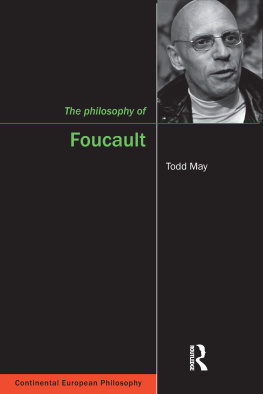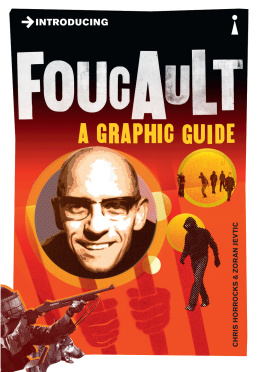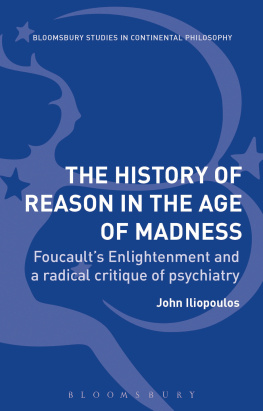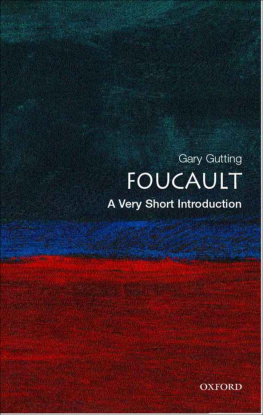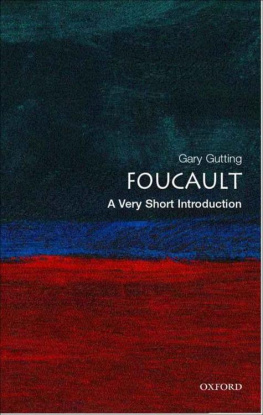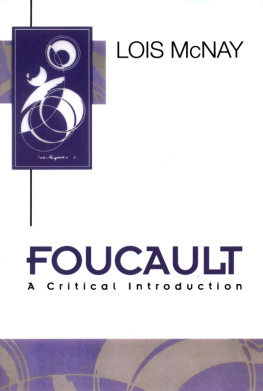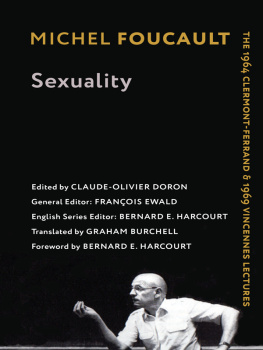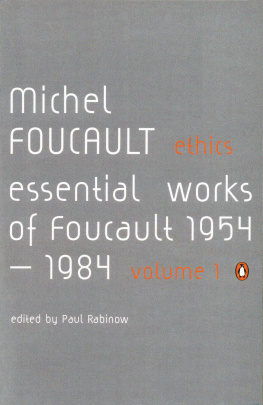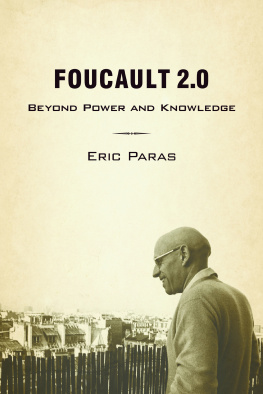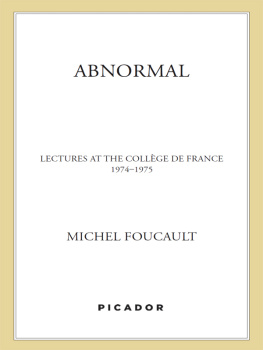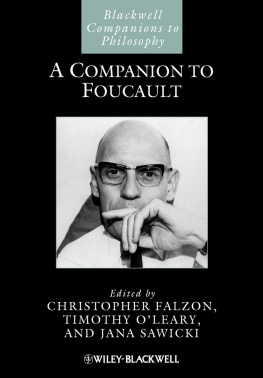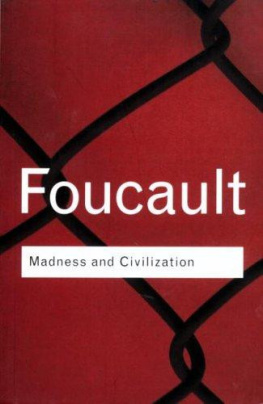The Philosophy of Foucault
Continental European Philosophy
This series provides accessible and stimulating introductions to the ideas of continental thinkers who have shaped the fundamentals of European philosophical thought. Powerful and radical, the ideas of these philosophers have often been contested, but they remain key to understanding current philosophical thinking as well as the current direction of disciplines such as political science, literary theory, comparative literature, art history, and cultural studies. Each book seeks to combine clarity with depth, introducing fresh insights and wider perspectives while also providing a comprehensive survey of each thinker's philosophical ideas.
Published titles
The Philosophy of Foucault
Todd May
The Philosophy of Gadamer
Jean Grondin
The Philosophy of Habermas
Andrew Edgar
The Philosophy of Kierkegaard
George Pattison
The Philosophy of Merleau-Ponty
Eric Matthews
The Philosophy of Nietzsche
Rex Welshon
The Philosophy of Schopenhauer
Dale Jacquette
Forthcoming titles include
The Philosophy of Derrida
Mark Dooley and Liam Kavanagh
The Philosophy of Hegel
Allen Speight
The Philosophy of Husserl
Burt Hopkins
The Philosophy of Kant
Jim O'Shea
The Philosophy of Rousseau
Patrick Riley, Sr and Patrick Riley, Jr
The Philosophy of Sartre
Anthony Hatzimoysis
The Philosophy of Foucault
Todd May
First published in 2006
by Acumen
Published 2014
by Routledge
2 Park Square, Milton Park, Abingdon, Oxon OX14 4RN
711 Third Avenue, New York, NY 10017, USA
Routledge is an imprint of the Taylor & Francis group, an informa business
Todd May, 2006
This book is copyright under the Berne Convention.
No reproduction without permission.
All rights reserved. No part of this book may be reprinted or reproduced or utilised in any form or by any electronic, mechanical, or other means, now known or hereafter invented, including photocopying and recording, or in any information storage or retrieval system, without permission in writing from the publishers.
Notices
Practitioners and researchers must always rely on their own experience and knowledge in evaluating and using any information, methods, compounds, or experiments described herein. In using such information or methods they should be mindful of their own safety and the safety of others, including parties for whom they have a professional responsibility.
To the fullest extent of the law, neither the Publisher nor the authors, contributors, or editors, assume any liability for any injury and/or damage to persons or property as a matter of products liability, negligence or otherwise, or from any use or operation of any methods, products, instructions, or ideas contained in the material herein.
ISBN-13: 978-1-84465-056-9 (hardcover)
ISBN-13: 978-1-84465-057-6 (paperback)
British Library Cataloguing-in-Publication Data
A catalogue record for this book is available from the British Library.
Typeset in Classical Garamond by Graphicraft Limited, Hong Kong.
For Kathleen, David, Rachel and Joel
Contents
- AKDL The Archaeology of Knowledge and The Discourse on Language (1972).
- ALCF Abnormal: Lectures at the College de France, 1974-1975 (2003).
- BC The Birth of the Clinic (1973).
- CS The Care of the Self (1986).
- CT/IH "Critical Theory/Intellectual History" (an interview with Gerard Raulet) (1988).
- DP Discipline and Punish: The Birth of the Prison (1977).
- EC "The Ethics of the Concern of the Self as a Practice of Freedom" (1997).
- Gov. "Governmentality" (1991).
- HFAC Histoire de la folie l'ge classique (1972).
- HS The History of Sexuality, Volume I: An Introduction (1978).
- HSLCF The Hermeneutics of the Subject: Lectures at the Collge de France 1981-1982 (2005).
- IP "Intellectuals and Power" (1977).
- MBPF "My Body, This Paper, This Fire" (1999).
- MC Madness and Civilization: A History of Insanity in the Age of Reason (1965).
- NB Naissance de la biopolitique: Cours au College de France 1978-1979 (2004).
- NGH "Nietzsche, Genealogy, History" (1977).
- OGE "On the Genealogy of Ethics: An Overview of a Work in Progress" (1984).
- OT The Order of Things: An Archaeology of the Human Sciences (1971).
- PC "Practicing Criticism" (1988).
- QM "Questions of Method" (1991).
- SP "The Subject and Power" (1982).
- STP Securite, territoire, population: Cours au Collge de France 1977-1978 (2004).
- TP "Truth and Power" (1980).
- UP The Use of Pleasure: Volume 2 of The History of Sexuality (1985).
- WE "What is Enlightenment?" (1997).
I would like to thank Acumen, and especially Steven Gerrard, Elizabeth Teague, Kate Williams, Sue Hadden and three anonymous reviewers for their generous help in improving the manuscript and seeing it through.
CHAPTER ONE
Introduction: who are we?
Why study a philosopher, a philosophically oriented historian, a thinker? Why grapple with a body of thought that is difficult, often elusive? Why forsake the pleasures of sport, the company of friends, a novel or a videogame for the slow, patient activity of coming to understand a set of texts that, far from inviting one in, seem often designed to keep one at bay?
These are not idle questions. One might be told, in response to them, that the rigours of thought are good for the mind, that grappling with difficult concepts is bracing, or strengthening, or a sign of good character. These are, it seems to me, bad answers. Not that a person should not have a good mind or a good character. But why study philosophy in order to achieve these? Would mathematics, or physics, or the law not do just as well? There is nothing less rigorous about these disciplines than there is about philosophy. They offer challenges to the mind, and in addition training in something that might come in handy down the road.
If one is to study a philosophical figure, if one is, to paraphrase James Joyce, to forge one's own soul in the smithy of their mind, there must be a better reason on offer than simply being told that conceptual difficulty is good for you. There must be something about the thinker's being philosophical, or, in the case of Michel Foucault, at least philosophically oriented, that is itself compelling. That reason need not be practical, in the traditional sense of the term. It need not lead to a job, or a social position, or recognition by a broader public. Ideology aside, there is no reason to believe that these are all that people seek. The reason one might study a philosopher can be less goal-oriented, or more subtle. But, given the alternative ways of spending one's time, the reason ought to be a good one.
The philosopher Gilles Deleuze tells us that:
a philosophical theory is an elaborately developed question, and nothing else; by itself and in itself, it is not the resolution to a
Deleuze suggests that a philosophical theory is not to be defined by the answer it gives but by the question it asks. The point of reading philosophy, to him, is not one of seeking solutions but of elaborating the implications of a question.
We must be clear here. Deleuze is not arguing that philosophy is about questions rather than about answers. Or at least he is not arguing it in any simple way. He is not saying only that it is the questions that matter rather than the answers. There is something empty, after all, in being told that if one asks the right question, then what comes after does not matter. What would the point of asking a question be, if the response did not somehow matter? When he talks about the elaboration of the necessary implications of a formulated question, he is talking not only about questions, but also about responses. Those responses, those elaborations, however, need not be as straightforward as answers to traditional questions. They need not be as narrow as answers to questions such as "Where do you live?" or "What is the GNP of Sierra Leone?" They can be difficult, or shifting, or open-ended. If they are to be worthwhile, however, they need to respond to a question that is good and rigorous. And that is where the riches of philosophy lie.

